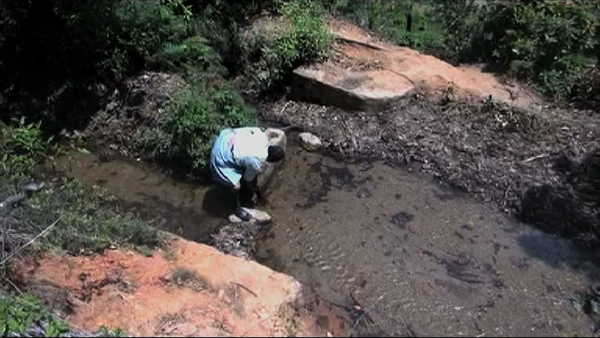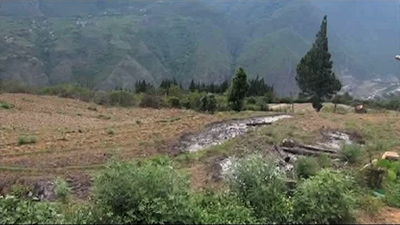 Some people of Khamaedna and Changkha Chiwog under Gase Tshogongm Gewog in Wangdue Phodrang are facing acute shortage of irrigation water. They claim that unequal and improper water distribution system causes the problem in their community.
Some people of Khamaedna and Changkha Chiwog under Gase Tshogongm Gewog in Wangdue Phodrang are facing acute shortage of irrigation water. They claim that unequal and improper water distribution system causes the problem in their community.
The people in the gewog follow the traditional water distribution system, which they do not think is a fair system. In this system, the amount of water one gets is measured by a stalk of long grass according to their wetland holdings.
“I don’t know on what basis the current water distribution system was made. Nobody knows about which expert made this system. So, according to the development, there is also a water act mentioning that it can be either practised as per the current system if there is no issue in the community, or as per the water act 2011, it says the water should be distributed according to the acres and decimals of the lands,” said Kinley Wangchuk from Khamaedna, Wangdue Phodrang.
 According to the Water Act of Bhutan 2011, section 44(a), Water from an irrigation channel shall be allocated either through mutual understanding or in accordance with existing practices, depending on the size of land holdings and the quantity of water in the channel, and subject to the constitution and bye-laws of the relevant Water Users’ Association. the locals argue that this is not followed in this system.
According to the Water Act of Bhutan 2011, section 44(a), Water from an irrigation channel shall be allocated either through mutual understanding or in accordance with existing practices, depending on the size of land holdings and the quantity of water in the channel, and subject to the constitution and bye-laws of the relevant Water Users’ Association. the locals argue that this is not followed in this system.
“If the water supply system is made according to the size of lands, the owners will get the water amount according to the size of lands. Thereafter, it will be more convenient for us to do according to that situation. We would accept it if the water supply system is made according to the quantity of an individual’s land.” Tobgay, also from Khamaedna, said.
In this water distribution system, new households who either bought lands or who have resettled after inheriting their shares, will not get irrigation water unless they also inherit/buy the share of the water along with the land they bought/inherited.
“I have told the landowner to give me the water along with the land when I bought from them. They even agreed. But later on, they didn’t give me the water. We cannot complete our paddy cultivation works on time when we do not have water. Moreover, we don’t get a good yield at the end, if we get late to do the cultivation works,” Said Tshechu, also from Khamedna chiwog.
They say their village is firstly located far away from the water distribution point and secondly a small amount of water never reaches to their fields on time. Locals say this is not a new issue, and it has even created some misunderstanding among the communities now.
Khamaedna chiwog is located below the road of Gase Tshogongm Gewog Center and schools. They share their irrigation water from the Khatoedkha chiwog side, which is above their chiwog.
Locals say this is not only the problem in the gewog. They also have some other different issues caused by the current water supply system. They say there is a high chance of arising some critical issues in their communities in future due to the poor water distribution system.
“When we do not have water, we are resorted to stealing from others. When we steal the water, we have to pay a fine of Nu 500. So, I am planning to convert my wetland to dry land if the weather remains sunny since we don’t get water here,” said Luchoe, from Changkha Chiwog.
However, on the other hand, the locals who own maximum amount of irrigation water say it is their privilege and this distribution system was inherited long time ago in their communities from the time of their forefathers itself.
“During those days, people who have more lands used to undergo everything extra compared to others. So, this water distribution system is also believed to be made based on these activities. Likewise even today, people who have maximum lands are entitled to more water. Actually, we have an equal watering duration for one day and night. We only have some difference in water source distance, otherwise, we all have an equal water supply. We neither suppress and dominate them anymore,” said Phurba, from Khatoedkha Chiwog.
“We have very limited water and we cannot share them from our water since we do not have enough water. I feel it would be better if the water distribution system can be kept as it is. I feel there won’t be any problem if the government intervene and solve the issue as the government will take the risk in future,” added Dorji, from Khamaedna.
Chethey is one of the current water caretakers and he distributes water in rotation basis above Changkha village. He says communities have got various entitlement of irrigation water. The water canal exclusively serves the people of three chiwogs in the gewog. Locals say the water is annually becoming smaller due to drying up at the source itself and Tengalum is the only water source for them. For the people of Khamaedna chiwog, they share their irrigation water supply from Thoukha village.
However, according to the Gewog Administration, besides drying up of the water source, the Basic Health Unit, schools and some government offices in the gewog also share their drinking water from this canal aggravating the situation.
“I am planning to start with the additional water supply connection work from Hesotsangma Source in Gase Tshogwogm gewog within 2019-2020. If possible, we will try to connect it with our old canal by 2020. Even the dzongkhag engineer and agriculture officer had assured its feasibility within this year.” Kinley Gyeltshen, the Gup of Gase Tshogongm Gewog, said.
The gup informed that they are working jointly with Gase Tshowogm Gewog administration and allocated about Nu 80 M for the project. However, nobody knows about when the present irrigation water canal was built.
Since about fifty-eight households in the gewog are not satisfied with the current water distribution system, they filed the complaint to the Wangdue Phodrang Dzongkhag Administration in 2011.
Dzongkhag administration upon examination found the gewog has an order from the high court on the same issue. The dzongkhag administration is waiting for the legal interpretation of court order versus water act from the Office of the Attorney General.




